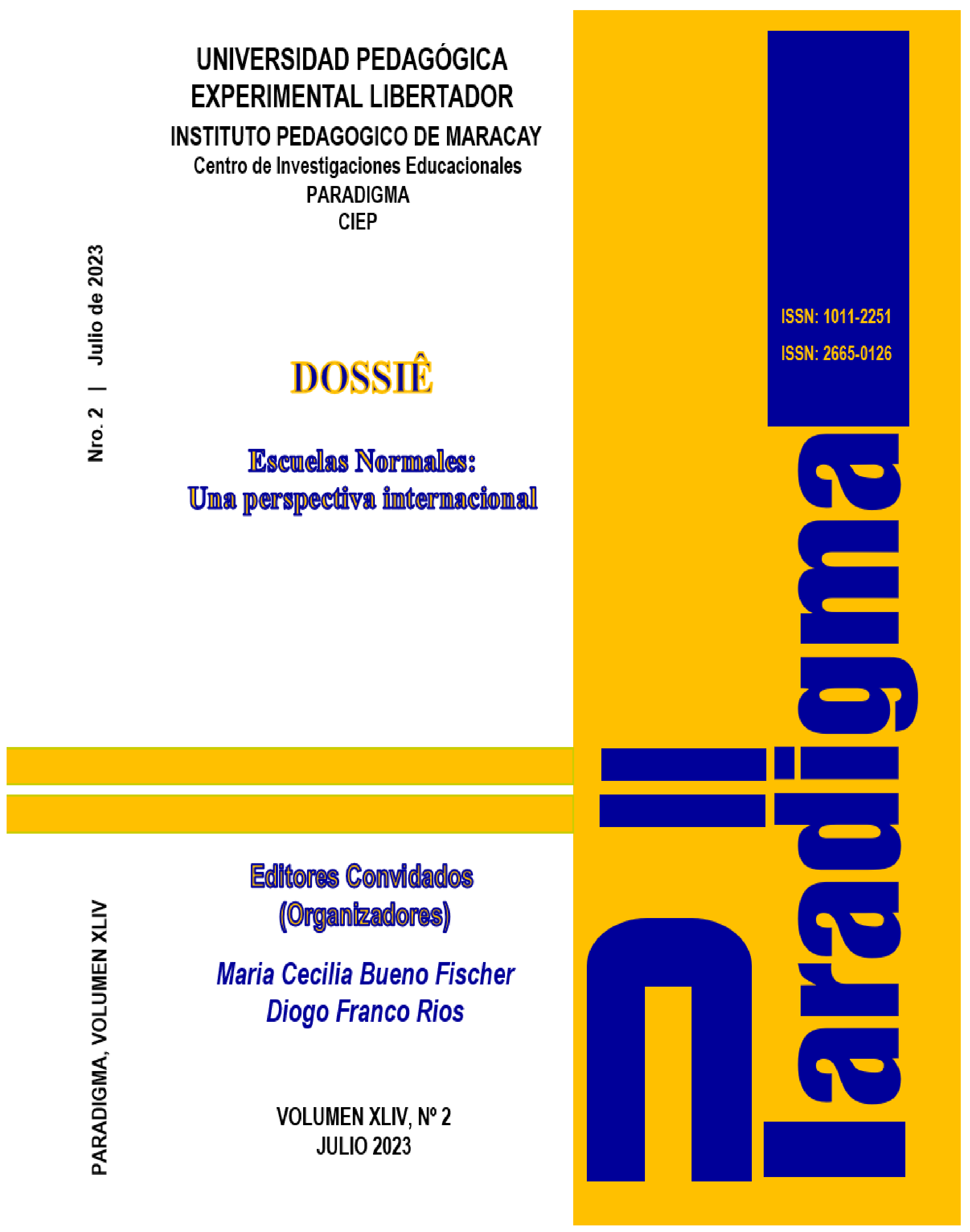Informal use of mathematics in the classroom: The perspective of graduate students in Rural Education
DOI:
10.37618/PARADIGMA.1011-2251.2023.p374-394.id1363Keywords:
Ethnomathematics, Youth and Adult Education, Formal and informal mathematical knowledge, Interaction in the classroomAbstract
The research carried out had the objective of analyzing the perspective of students of the Specialization Course in Rural Education in relation to the informal use of mathematics in the classroom. The informal use of mathematics in the classroom was addressed, focusing on a specific case involving a Youth and Adult Education (AYE) class. The qualitative case study was conducted with 8 participating students and took place remotely in June 2022, through the Google Meet platform. As an instrument, an online questionnaire with 6 open questions was used, which explored the participants' opinions about the attitude of a teacher and a student in a situation of disagreement regarding the use of formal mathematics as opposed to practical experience. The students' responses were analyzed and compared. The results indicate that the participants value both theoretical and practical knowledge and recognize the importance of dialogue and interaction between teacher and student. They also emphasize the need to balance theoretical and practical knowledge in the classroom and to value students' prior experience and knowledge. The study highlights the relevance of considering different educational perspectives and adapting the pedagogical approach to student needs and experiences, especially in AYE contexts.Downloads
References
Bogdan, R. C., & Biklen, S. K. (1994). Investigação Qualitativa em Educação. (M. J. Alvarez, S. B. Santos, & T. M. Baptista, Trads.) Porto-Portugal: Porto Editora.
Bryman, A. (2016). Social research methods (5ª ed.). Oxford-Inglaterra: Oxford University Press.
Creswell, J. W. (2010). Projeto de pesquisa: métodos qualitativo, quantitativo e misto (3ª ed.). (M. F. Lopes, Trad.) Porto Alegre: Artmed.
D`Ambrosio, U. (2015). Etnomatemática: elo entre as tradições e a modernidade. Belo Horizonte: Autêntica.
D’Ambrósio, U. (2012). Educação matemática: da teoria à prática (23ª ed.). Campinas: Papirus.
D'Ambrosio, U. (1985). Ethnomathematics and its place in the history and pedagogy of mathematics. For the Learning of Mathematics, 5(1), pp. 44-48. Acesso em 12 de fev. de 2023, disponível em https://www.jstor.org/stable/40247876
Fiorentini, D., & Lorenzato, S. (2006). Investigação em educação matemática: percursos teóricos e metodológicos. Campinas: Autores Associados.
Freire, P. (1983). Educação e Mudança (11ª ed.). Rio de Janeiro: Paz e Terra.
Godinho, M. d. (2011). As diferenças culturais dos alunos da educação de jovens e adultos do ensino médio: uma visão etnomatemática. 2011. 189f. Rio Claro: Dissertação (Mestrado em Educação Matemática) – Universidade Estadual Paulista, Rio Claro. Acesso em 14 de set. de 2022, disponível em http://hdl.handle.net/11449/91048
Knijnik, G., Wanderer, F., & Oliveira, C. J. (2006). Etnomatemática: currículo e formação de professores (2ª ed.). Santa Cruz do Sul: Edunisc.
Monteiro, A. (1998). Etnomatematica: as possibilidades pedagogicas num curso de alfabetização para trabalhadores rurais assentados. 1998. 200f. Campinas: Tese (Doutorado em Educação) - Universidade Estadual de Campinas. doi:https://doi.org/10.47749/T/UNICAMP.1998.124824
Moraes, A. R., & Rolkouski, E. (2008). Considerações sobre Etnomatemática e suas implicações em sala de aula. Acesso em 12 de set. de 2022, disponível em Dia a Dia Educação: http://www.diaadiaeducacao.pr.gov.br/portals/pde/arquivos/2430-8.pdf
Passos, C. M. (2008). Etnomatemática e educação matemática crítica: conexões teóricas e práticas. 2008. 150f. Belo Horizonte: Dissertação (Mestrado em Educação) - Universidade Federal de Minas Gerais, Belo Horizonte. Acesso em 13 de set. de 2022, disponível em http://hdl.handle.net/1843/FAEC-84VJLS
Rosa, M., & Orey, D. C. (2011). Ethnomathematics: the cultural aspects of mathematics. Revista Latinoamericana de Etnomatemática, 4(2), pp. 32-54. Acesso em 18 de mar. de 2023, disponível em https://revista.etnomatematica.org/index.php/RevLatEm/article/view/32
Sampieri, R. H., Collado, C. F., & Lucio, P. B. (2013). Metodologia de pesquisa (5ª ed.). (D. V. Moraes, Trad.) Porto Alegre: Penso.
Santos, B. d. (1996). Para uma pedagogia do conflito. Em L. H. Silva, J. C. Azevedo, & E. S. Santos, Novos Mapas Culturais: novas perspectivas educacionais (pp. 525-546). Porto Alegre: Sulina. doi:https://doi.org/10.2307/j.ctvt6rkm6.24
Santos, J. B., Lara, I. C., Ferreira, G. d., & Lima, V. M. (2017). Etnomatemática e as práticas em sala de aula: um estudo a partir de dissertações e teses. Congresso Internacional de Ensino da Matemática. 7. Canoas: Universidade Luterana do Brasil. Acesso em 12 de set. de 2022, disponível em https://repositorio.pucrs.br/dspace/bitstream/10923/11592/2/Etnomatematica_e_as_praticas_em_sala_de_aula_um_estudo_a_partir_de_dissertacoes_e_teses.pdf
Schneider, S. M. (2010). Esse é o meu lugar... esse não é o meu lugar: relações geracionais e práticas de numeramento na Escola de EJA. 2010. 206 f. Belo Horizonte: Tese (Doutorado em Educação) - Faculdade de Educação, Universidade Federal de Minas Gerais, Belo Horizonte. Acesso em 12 de mar. de 2023, disponível em https://repositorio.ufmg.br/handle/1843/BUOS-9LNM8K
Schneider, S. M., & Fonseca, M. d. (2014). Práticas Laborais nas Salas de Aula de Matemática da EJA: perspectivas e tensões nas concepções de aprendizagem. Bolema, 25(50), pp. 1287-1302. doi:https://doi.org/10.1590/1980-4415v28n50a14
Valero, P. (2004). Socio-political perspectives on mathematics education. Em P. Valero, & R. Zevenbergen, Researching the Socio-Political Dimensions of Mathematics Education. Mathematics Education Library (Vol. 35, pp. 5–23). Boston, MA: Springer. doi:https://doi.org/10.1007/1-4020-7914-1_2
Downloads
Published
Métricas
Visualizações do artigo: 122 PDF downloads: 46 PDF (Español (España)) downloads: 27


 English
English
 Español (España)
Español (España)
 Français (France)
Français (France)
 Português (Brasil)
Português (Brasil)




















































